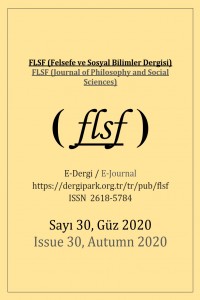Abstract
In this paper will be shown that will objectifies itself in different steps, will is an evolutionary process in the objectification steps, the evolutionary process ends in human life and the reason for this is the human ability to silence will. It will be revealed that evolution ends in human life due to the aesthetic geniuses and individuals who are devoted to ethics to stop will. It will be shown that saying “no” to will, thanks to morality and art, also means saying “no” to suffering. For Schopenhauer, will constitutes a variety of appearances and phenomena. It is the main problem of this paper to show how denial or rejection of will, which makes the world of phenomena possible and is the essence of both the particular and the universal, is possible through morality and art
References
- Darwin, Charles, Türlerin Kökeni, Çev. Bahar Kılıç, ALFA Bilim, İstanbul, 2018.
- Eren, Işık, Sanat ve Bilgi ilişkisi: A. Schopenhauer ve M. Heidegger’in Sanat Görüşleri, Asa Kitabevi, Bursa, 2006.
- İnam, Ahmet “Schopenhauer’da Estetik Kurtuluş”, Felsefe Dünyası, Sayı: 9, 1993, s. 8-13.
- Janaway, Christopher, Schopenhauer, Çev. R. Çağrı Ataman, Altın Kitaplar Yayınevi, İstanbul, 2007.
- Kuçuradi, İoanna, Schopenhauer ve İnsan, Türkiye Felsefe Kurumu, Ankara, 2013.
- Lovejoy, Arthur O., “Bir Evrimci Olarak Schopenhauer”, Fikir Mimarları Dizisi: Schopenhauer, Yayıma Hazırlayan Ahmet Aydoğan, Say Yayınları, İstanbul, 2009, s. 193-220.
- Mayr, Ernst, What Evolution Is, Phoenix Paperback, London, 2002.
- Nussbaum, Martha C., Upheavals of Thought: The Intelligence of Emotions, Cambridge University Press, UK, 2001.
- Russell, Bertrand, Felsefe Sorunları, Çev. Vehbi Hacıkadiroğlu, Kabalcı Yayınevi, İstanbul, 1994.
- Schopenhauer, Arthur, The World As Will and Representation VOLUME I, Translated by E.F.J. Payne, Dover Publications, New York, 1969.
- Schopenhauer, Arthur, İstencin Özgürlüğü Üstüne, Çev. Mehtap Söyler, Öteki Yayınevi, Ankara, 2000.
- Schopenhauer, Arthur, Güzelin Metafiziği: Sanatın ve Güzelin Sırları, Çev. Ahmet Aydoğan, Say Yayınları, İstanbul, 2013.
- Schopenhauer, Arthur, (2014), İsteme ve Tasarım Olarak Dünya, Çeviren: Levent Özşar, Biblos Kitabevi Yayınları, Bursa, 2014.
- Schopenhauer, Arthur, Parerga and Paralipomena Short Philosophical Essay VOLUME 2, Translated and Edited by Adrian del Caro; Christopher Janaway, Cambridge University Press, UK, 2015.
- Schopenhauer, Arthur, Merhamet, Çev. Zekâi Kocatürk, Dergâh Yayınları, İstanbul, 2017.
- Schopenhauer, Arthur, İsteme ve Tasavvur Olarak Dünya, Çev. A. Onur Aktaş, Doğu Batı Yayınları, Ankara, 2020.
- Shapsay, Sandra, Reconstructing Schopenhauer’s Ethics: Hope, Compassion and Animal Welfare, Oxford University Press, New York, 2019.
- Spinoza, Benedictus, Mektuplar, Çev. Emine Ayhan, Dost Kitabevi, Ankara, 2014.
- Young, Julian, Schopenhauer, Routledge Taylor &Francis Group, New York, 2005.
- Wittgenstein, Ludwig, Tractatus Logico-Philosophicus, Çev. Oruç Aruoba, Metis Yayınları, İstanbul, 2013.
Abstract
Bu çalışmada istemenin kendisini farklı basamaklar halinde nesneleştirdiği, istemenin nesneleşme basamaklarında bir tür evrimsel süreç olduğu, evrimsel sürecin insanda son bulduğu ve bunun nedeninin ise insanın istemeyi susturma kabiliyeti olduğu gösterilecektir. Bunlara ek olarak estetik açıdan dehaların ve etiğe teslim olmuş bireylerin istemeyi durdurma kabiliyetlerinden dolayı evrimin insanda son bulduğu ortaya konacaktır. Ahlak ve sanat sayesinde istemeye “hayır” demenin, aynı zamanda acı çekmeye de “hayır” demek anlamına geldiği gösterilecektir. Schopenhauer açısından isteme; görünümlerin, fenomenlerin ya da tezahürlerin çeşitliliğini oluşturur. Fenomenler dünyasını mümkün kılan ve hem tekilin hem de tümelin özü olan istemenin yadsınması ya da reddedilmesinin ahlak ve sanat aracılığıyla nasıl mümkün olduğunu göstermek bu çalışmanın temel problemidir.
References
- Darwin, Charles, Türlerin Kökeni, Çev. Bahar Kılıç, ALFA Bilim, İstanbul, 2018.
- Eren, Işık, Sanat ve Bilgi ilişkisi: A. Schopenhauer ve M. Heidegger’in Sanat Görüşleri, Asa Kitabevi, Bursa, 2006.
- İnam, Ahmet “Schopenhauer’da Estetik Kurtuluş”, Felsefe Dünyası, Sayı: 9, 1993, s. 8-13.
- Janaway, Christopher, Schopenhauer, Çev. R. Çağrı Ataman, Altın Kitaplar Yayınevi, İstanbul, 2007.
- Kuçuradi, İoanna, Schopenhauer ve İnsan, Türkiye Felsefe Kurumu, Ankara, 2013.
- Lovejoy, Arthur O., “Bir Evrimci Olarak Schopenhauer”, Fikir Mimarları Dizisi: Schopenhauer, Yayıma Hazırlayan Ahmet Aydoğan, Say Yayınları, İstanbul, 2009, s. 193-220.
- Mayr, Ernst, What Evolution Is, Phoenix Paperback, London, 2002.
- Nussbaum, Martha C., Upheavals of Thought: The Intelligence of Emotions, Cambridge University Press, UK, 2001.
- Russell, Bertrand, Felsefe Sorunları, Çev. Vehbi Hacıkadiroğlu, Kabalcı Yayınevi, İstanbul, 1994.
- Schopenhauer, Arthur, The World As Will and Representation VOLUME I, Translated by E.F.J. Payne, Dover Publications, New York, 1969.
- Schopenhauer, Arthur, İstencin Özgürlüğü Üstüne, Çev. Mehtap Söyler, Öteki Yayınevi, Ankara, 2000.
- Schopenhauer, Arthur, Güzelin Metafiziği: Sanatın ve Güzelin Sırları, Çev. Ahmet Aydoğan, Say Yayınları, İstanbul, 2013.
- Schopenhauer, Arthur, (2014), İsteme ve Tasarım Olarak Dünya, Çeviren: Levent Özşar, Biblos Kitabevi Yayınları, Bursa, 2014.
- Schopenhauer, Arthur, Parerga and Paralipomena Short Philosophical Essay VOLUME 2, Translated and Edited by Adrian del Caro; Christopher Janaway, Cambridge University Press, UK, 2015.
- Schopenhauer, Arthur, Merhamet, Çev. Zekâi Kocatürk, Dergâh Yayınları, İstanbul, 2017.
- Schopenhauer, Arthur, İsteme ve Tasavvur Olarak Dünya, Çev. A. Onur Aktaş, Doğu Batı Yayınları, Ankara, 2020.
- Shapsay, Sandra, Reconstructing Schopenhauer’s Ethics: Hope, Compassion and Animal Welfare, Oxford University Press, New York, 2019.
- Spinoza, Benedictus, Mektuplar, Çev. Emine Ayhan, Dost Kitabevi, Ankara, 2014.
- Young, Julian, Schopenhauer, Routledge Taylor &Francis Group, New York, 2005.
- Wittgenstein, Ludwig, Tractatus Logico-Philosophicus, Çev. Oruç Aruoba, Metis Yayınları, İstanbul, 2013.
Details
| Primary Language | Turkish |
|---|---|
| Subjects | Philosophy |
| Journal Section | Articles |
| Authors | |
| Publication Date | December 10, 2020 |
| Submission Date | September 30, 2020 |
| Acceptance Date | November 1, 2020 |
| Published in Issue | Year 2020 Issue: 30 |
Starting from 2024, our journal will be published in 3 issues as two regular and one special issues. These issues will be published In May (regular issue), September (special issue) and December (regular issue).
Acceptance of articles for our special issue and our regular issue in December will begin on March 15.
Only articles within the scope of the file will be included in our special issue.
Thank you for your attention.


